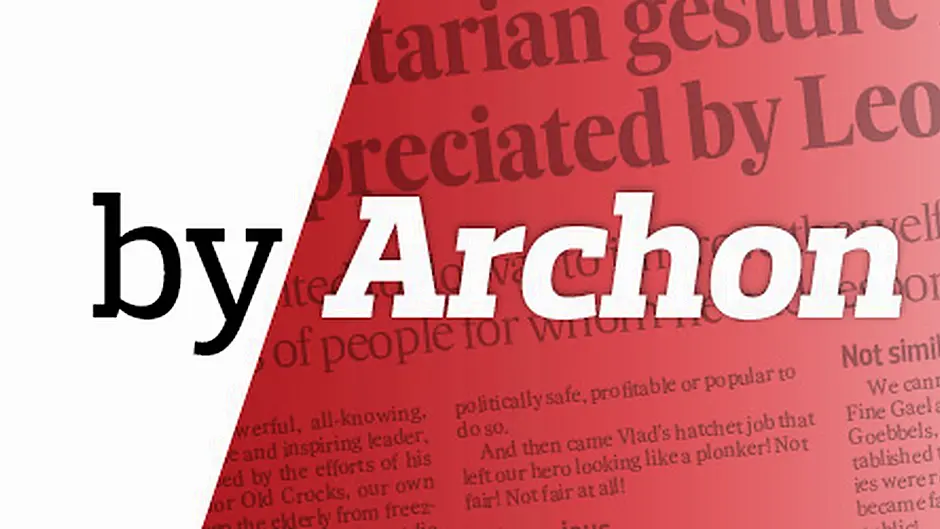Times have changed as Church and religious orders no longer rule the roost with the secular State taking over
THE story that Pope Pius XI sought to initiate a holy war against communist Russia probably is a myth. However, it’s a fact that some Russian counter-revolutionaries fought under the banner of ‘Jesus Regiments’ and ‘Holy Virgin Regiments’ – such was their fiery response to the Bolsheviks.
In this country, the Catholic Church paid special attention to the potential growth of communism. Singled out for attention were trade unionists, unemployed political agitators, writers, poets and anyone who expressed the slightest interest in ‘socialism’.
Even this scribe’s Ma (God rest her progressive soul!) attracted the political busy-bodying of a Very Rev Cleric in UCC whose job involved rooting out in Cork city any manifestation of communism, imaginary or real (suspicion fell on the Ma on account of her organising a branch of the Irish Housewives Association!).
And, when it came to the usual suspects getting a job in a Catholic school, quasi-secret Vigilance Committees organised by Bishop Lucey made sure that only the rigorously devout were chosen.
The current educational situation, of course, is quite the opposite. Religious orders no longer rule the roost and, indeed, ‘god-less’ organisations are an integral part of the State’s educational apparatus. Political parties, such as Fine Gael and Fianna Fáil, in turn, declare their approval of the changed religious and educational climate in Ireland.
Educate Together
An almost complete swing in attitudes towards religious school management has taken place, with the current Fine Gael government committed to reducing the influence of the Catholic Church in schools.
At primary level, the number of multi-denominational schools has risen from 73 to 119 – an increase of 63% – and they are the fastest growing school patrons in the State. That aside, the majority of pupils (90 per cent of enrolments) attend Catholic schools.
Groups involved in the multi-denominational process include Educate Together, the Community National School model, and the all-Irish An Foras Pátrúnachta, a patron of Gaelscoileanna.
The fascinating aspect of this new educational dispensation has been the introduction of practices that have stirred some controversy. Staff in some Dublin primary schools who are opposed to having their patronage divested to a multi-denominational set-up have warned parents that the abolition of carol services, nativity plays at Christmas and Easter celebrations could follow.
Educate Together, however, publicly declared that it has no interest in imposing an ethos against the will of local school communities.
Yet, a voguish demand by parents for secular freethinking, even for children as young as five, is current among parents in Dublin – which, ironically, amounts to a comical conclusion of the great work begun in the Protestant Reformation when ‘personal conscience’ was all the rage.
No bias here?
On top of that, noisy disagreement recently broke out in a multi-denominational primary school in Dublin over a decision to bring in the Catholic marriage agency, Accord, to provide sex education for fifth and sixth class children.
Concerned parents at Castleknock Educate Together kept their children at home, fearing that the little ones would be affected by Catholic-religion stuff. According to RTÉ News, parents were unhappy at the prospect of a Catholic organisation, Accord, influencing young minds, having chosen to send their children to the multi-denominational school ‘to get away from that kind of thing’ (shades of Fr Ted?).
Educate Together stated that the matter of contracting external agencies, such as Accord, was the prerogative of the school board of management. Nevertheless, it expected all its schools to deliver the full Relationships and Sexuality curriculum without reference to any religious-based bias.
Now, ‘bias’ was an interesting word for the Educate Together syndicate to use. It suggested prejudice and partiality and, within the context of religion, raised the prospect of irrational intolerance. Quite unintentionally (we are sure), the impression was given that Educate Together was an organisation that easily took offence.
Sectarianism?
Yet, the word ‘bias’ accurately described the response of some parents who publicly argued that Accord, funded by the Catholic Church, was not ‘fit for purpose’ to deliver an RSE programme in a non-religious school.
For instance, a parent told RTÉ that she sent her children to the Educate Together school because she thought there would be ‘no religious interference.’ Another complained that Accord did not ‘validate’ same-sex relationships and that ‘they openly discriminated against gay people.’ Several parents said that inviting Accord went against the school’s multi-denominational ethos.
Yet, as our bar-stool philosopher from the Cork Arms explained, all education contains some sort of bias and even militant atheism in itself was a religion! He thought it strange that parents should want the Accord message to be excluded when we were living in times of great social, religious and political diversity.
He said: ‘Accord’s message, from what I understand of it, relates to marriage and having a lifelong commitment to marriage, through good and bad times. For parents to be opposed to their children hearing such an indispensable message simply doesn’t make sense.’ At that, everyone agreed, especially when the warning was issued to ‘drink up, lads, last round’!
But, of course, before being thrown out, another line of argument quickly was established by those who were ideologically opposed to the educational ambitions of Educate Together. Their concern was the whiff of something that smelled awfully like sectarianism. And that, they said, was really disturbing!
No Pope here?
Oddly enough there is no mention of Catholicism in the Irish Constitution although ‘the State acknowledges that the homage of public worship is due to Almighty God.’ For that matter, no religion is treated better or given an advantage over another. Nor does the State endow any religion or impose penalties due to religious belief.
Freedom of conscience and the practice of religion are subject to public order.
In other words, Ireland is one of the most religiously-free countries in the world. Being Catholic, Protestant, Muslim or Jewish in Ireland is more about heritage than belief – a remarkable endorsement of tolerance that, sadly, does not apply to the brethren up North where discrimination based on religion continues to poison relationships.
Down South, there is also a dark side, as the Education Together controversy revealed. Intolerance of the Catholic viewpoint certainly exists. It is an antipathy fuelled by politicos and media-types who want to see the end of religious-owned schools and hospitals.







